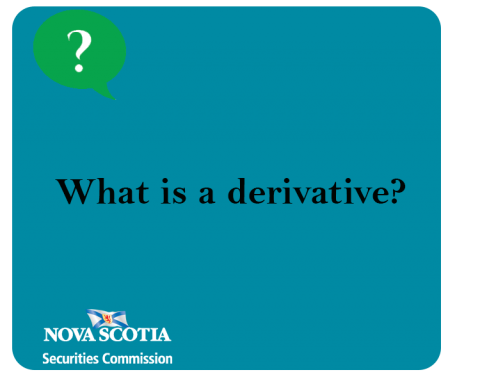Submitted by nsscadmin on

The Nova Scotia Securities Commission is responsible for the regulation of securities and of derivatives. A derivative is contract between two or more parties with the value of the contract being tied to an underlying interest. An underlying interest can include stocks, bonds, commodities, currencies, interest rates, an index or the weather.
Derivatives differ from securities because a derivative the investor does not own the underlying interest. Instead the investor enters into a contract speculating or hedging the direction of the price movement of the underlying interest via an agreement with another party.
Derivative contracts typically have some common terms such as strike or exercise price, time to maturity or expiry. Derivative contracts also employ leverage where investors do not have to provide the full amount of the contract in order to have a right or obligation under the contract. Typically, parties to a derivative contract do not receive or deliver the underlying interest, but settle the contract financially.
Derivatives can be classified into two categories: exchange-traded derivatives and over-the-counter (OTC) derivatives.
Exchange-traded derivatives are traded through exchanges, based on standardized exchange contracts with the exchange or clearinghouse as the counterparty to the contract. Exchange-traded options protect or the reduce the risk parties face from their counterparties through the exchange or clearinghouse.
OTC derivatives are privately negotiated contracts between the contracting parties directly. OTC derivatives are mostly between sophisticated parties such as financial institutions and institutional investors. OTC derivatives may not be clearing and parties may face higher counterparty risk. For example, investors using online foreign exchange platforms face the risk that the platform will not honor the terms of a contract if the dealer declares bankruptcy or is insolvent.
For investors derivatives are typically used in one of two ways – Hedging, or Speculating.
Hedging is a way for an investor to mitigate the risk of an asset or liability. For example, if you own a stock you can hedge against it to protect against the chance that the value of the stock may fall. Commonly known as a put option, you retain the right to sell your stock at a set price even if the value falls. If the stock price rises you gain the value because you own the stock. If the stock falls you still gain because you can sell it at the higher value agreed to. However, the value of the put option decreases or loses all value.
Speculating is guessing on the future price of an underlying interest. For example, an investor thinking the value of a stock may rise could enter into an option contract to purchase the stock at a set date for a set price. They are speculating that the stock value will rise, allowing them to purchase it below value at the set date.
There are different forms of derivatives, but the most common forms are future and forward contracts, options and swaps. We’ll examine each form more closely in future posts.
